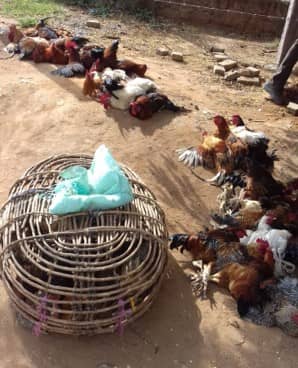Daily challenges in the Kenyan food system relate to food security, sustainable production and strengthening entrepreneurship and employment. Experiences and knowledge from the Dutch agri-food sector have the potential to contribute to these challenges. Especially in the field of reducing food losses.
The Embassy of the Kingdom of the Netherlands in Kenya is working on an analysis of the food system in collaboration with Wageningen University & Research (WUR) and Larive International. The aim of this study is to contribute to the transition of sustainable, resilient and inclusive food systems. The focus is on food processing and agro logistics.
Damaged avocados
The research looks at the factors that influence food waste within Kenyan food systems. The analysis focuses on the mango, avocado and poultry chains and analyzes the trends and developments that affect the losses. In addition, the focus is on the possibilities of initiating cooperation between Kenyan and Dutch parties in order to contribute to reducing food losses. The approach takes place from three angles: technological, economic and institutional.
Food losses as potential for entrepreneurship
According to FAO estimates, a third of all food produced worldwide is lost before it reaches the consumer.
'In Kenya, a large part of the production is lost at the beginning of the chain, close to the production process'
Food losses occur throughout the food chain, from the farm to the consumer. In Kenya and many other countries in East Africa, much of the production is lost at the beginning of the chain, close to the production process, especially during storage and during transport. Fresh fruit and vegetables and other perishable products such as meat and dairy are particularly affected by losses.
The causes of the losses are usually due to financial, managerial and technical factors, lack of proper storage and cooling facilities, extreme climatic conditions, poor infrastructure, limited initiatives in the field of food processing and lack of control within food chains.
Dutch knowledge and experience within the agri-food sector, especially in agrologistics, storage, transport, distribution and food processing, have the potential to contribute to reduce food losses in the Kenyan agricultural sector.
Kenyan example of zero energy avocado refrigerated and aggregation facility
Importance of the agricultural sector
Agriculture is one of the most important sectors in Kenya and an important source of food. 80% of the population is directly dependent on agriculture as a source of food and income. In addition, the agricultural sector is responsible for 65% of export revenues.
"Post-harvest losses in Kenya are estimated at 20%. Despite this, there is still relatively little attention for food processing and agrologistics. The losses in the fruit and vegetable chain can even be as high as 50%,” says Herman Snel, food system analysis team leader at WUR.
The population in Kenya is expected to grow to 90 million inhabitants by 2050. This growth is undoubtedly accompanied by increasing pressure on the food supply and on the sustainable use of natural resources.
Large amounts of agricultural crops are lost before they reach the market or consumer. The losses affect both small-scale and commercial producers in all links of the chain (intermediaries, suppliers, distributors, market traders, exporters, wholesalers). These losses remove significant revenues from the national economy and have a strong impact on the revenues of (small-scale) producers and traders. In addition, the losses also affect local and national food security because less food is available to consumers.

Example of transport and sale of poultry in Kenya
Transition food system is necessary
The challenges underscore the need to innovate and chart a course to radically change the ways of production and consumption. This effectively implements the UN Sustainable Development Goals and the goals of the Malabo Declaration that Kenya has signed.
To ensure food security for the growing population, Kenya should increasingly commit to a transition to a food system in which net agricultural production increases and food losses decrease. Food must be produced, processed and distributed sustainably and efficiently. This offers opportunities for food producers, entrepreneurs and other parties in the food chain. In addition, the transition to a sustainable food system has the potential to provide employment for women and young people, ensure better incomes for producers and positively influence food security.
“The WUR food system study shows that the Kenyan agricultural sector has experienced strong growth in recent decades in terms of production, productivity and growing orientation towards the (export) market. Despite this, the successes achieved have not yet led to structural improvement with regard to food security and the fight against poverty,” says Herman.
The results of the analysis are used by the Netherlands Embassy in Kenya to set up Kenyan-Dutch partnerships in consultation with local partners. The emphasis here is on strengthening the cooperation between knowledge institutes, entrepreneurs and service providers who can make existing know-how and experience practically applicable.
For more information about food system analysis and food losses in Kenya, please contact Herman Snel, Food System Analysis Team Leader.
Would you like to learn more about our activities or do you have any questions? Please send an email to nai-lnv@minbuza.nl. We give regular updates on developments in the agriculture sector in Kenya and Tanzania on this website and on our Twitter @NLAgriKenya. If you would like to receive more information about the agribusiness in Kenya or Tanzania please subscribe to our newsletter, by e-mailing us dar-lnv@minbuza.nl or nai-lnv@minbuza.nl.